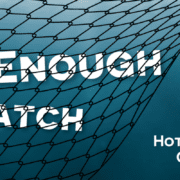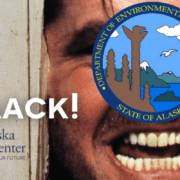Bro, Enough Bycatch
TAKE ACTION: Submit Your Comment Today
As the skies taunt us off and on with sunshine and rain, many Alaskans are taking the time to fill our freezers and hit the waters. Whether it be rods and reels or nets of varying degrees of size from dip nets to trawlers. Our fishing economy accommodates all sizes and most Alaskans know how to fish sustainably to ensure the runs return and that Alaskans further inland have the opportunity to feed their families and sustain their way of life. These waters can be bountiful for all if we show a little respect and moderation.
But moderation isn’t everyone’s net, and many out-of-state trawling companies are reaping it all and sowing bubkis for us. Over the past ten years, the Bering Sea and Gulf of Alaska trawl fleets have caught, killed, and discarded approximately 141 million pounds of salmon, halibut, crab, sablefish, and other species, yearly. It’s time for some intervention before they wreck the party for everyone.
While Washington-based trawl fleets guzzle up record numbers, western Alaskan fishing communities, salmon fishing, snow crab fishing, and Bristol Bay red king crab fishing have been severely limited or cut off altogether. The doors swung too wide open to some excessive party boys, and now we are left with more than a mess; Alaskans are without food to feed our families.
The primary issue is a massive hit on bycatch species. Species that are just tossed away by massive trawlers are critical to our communities’ livelihoods and health. Closures and reduced access straight up harm our communities. Overfishing straight up harms our ecosystems and the diversity of species we need to repair our waters and our climate.
Do we really need that many fish sticks and fake crab dips at the risk of Alaskans’ livelihood? From our perspective, what we need is better regulation so that Alaskan salmon, crab and pollock can sustainably fill our freezers and our nets, and if you’re so inclined to have your fish in stick form, you can still have it as an option. Slap a little tartar sauce on it, and pretend it’s from some amorphous yellow-hatted fisherman. But we can’t keep damaging the livelihoods of the rest of our state’s fisherfolk, subsistence or commercial, because there is a worldwide market for questionable finger food.
It’s time to take action and demand that dirty little word “regulations.” Right now, the National Oceanic and Atmospheric Administration (NOAA) fisheries is collecting comments to update guidelines for National Standards to better address environmental changes and inequity in federal fisheries management. We have the opportunity to say that the system is broken and give some real solutions on how to fix it before it’s too late.
The big loud drunk guy at the party can do some impressive feats, but it shouldn’t be at the risk of the broader community. We all deserve a chance to enjoy the party, right? It’s time that NOAA defines “fishing community” to include the importance of place-based communities directly tied to fisheries, including Alaska Native subsistence fisheries and Alaska coastal communities. It shouldn’t be on the party’s host to clean up the mess.
This comment period is important, and our priority should be a holistic approach that includes climate and ecosystem management. While there are numerous issues why our fish are in decline, this is an opportunity to do something tangible about it now.
Take action with us and get your voice heard before the drunk guy at the party and his well-funded friends crank up the karaoke and drown us all out with some crappy cover of Freebird.
In Salmon Solidarity,
The Alaska Center


